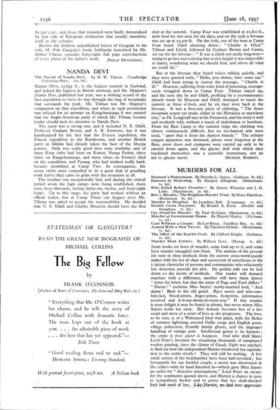NANDA DEVI
The Ascent of Nanda Devi. By H. W. Tilman. (Cambridge University Press. 12s. 6d.)
NANDA DEVI, 25,645 ft., is the highest summit in Garhwal, and indeed the highest in British territory, and Mr. Shipton's Nanda Devi, published last year, was a striking record of the first expedition to force its way through the ring of mountains that surrounds the peak. Mr. Tilman was Mr. Shipton's companion on that expedition, and when in 1936 permission was refused for an attempt on Kangchenjunga it was natural that the Anglo-American party of which Mr. Tilman became leader should turn its attention to Nanda Devi.
The party was a strong one, and it included N. E. Odell, Professor Graham Brown, and A. B. Emmons, but it was handicapped by the fact that the Everest expedition, the French expedition to the Karakoram, and another British party in Sikkim had already taken the best of the Sherpa porters. Only two really good men were available, and of these Kitar (who had been on Kamet, Nanga Parbat, three times on Kangchenjunga, and three times on Everest) died on the expedition, and Pasang, who had worked really hard, became snowblind at Camp Two. In consequence, the seven sahibs were compelled to do a great deal of gruelling work before they came to grips with the mountain at all.
The weather was exceptionally bad, and 'during the critical period when the high camps were being established, there were three blizzards, lasting thirty-six, twelve, and forty-eight hours. Up to this stage, the party had worked without an official leader, but at Camp Three (on August 21st) Mr. Tilman was asked to accept the responsibility. He decided that N. E. Odell and Charles Houston should have the first
shot at the summit. Camp Four was established at 21,800 ft., with food for two men for six days, and on the 25th a bivouac was set up at 23,500 ft. On the 27th, one of the men at Camp Four heard Odell shouting down : " Charlie is killed." Tilman and Lloyd, followed by Graham Brown and Carter, set out for the bivouac : " It was a climb not easily forgotten— trying to go fast and realising that at this height it was impossible to hurry, wondering what we should find, and above all what we could do."
But at the bivouac they heard voices talking quietly, and they were greeted with, " Hello, you blokes, have some tea:" Odell had been trying to convey the message, " Charlie is ill." Houston, suffering from some kind of poisoning, courage- ously struggled down to Camp Four. Tilman stayed up, and the next day he and Odell, profiting by a reconnaissance already made by Houston and Odell, managed to reach the summit at three o'clock, and by six they were back at the bivouac. It was a first-rate piece of climbing, " The finest mountain ascent yet made, either in the Himalaya or anywhere else," as Dr. Longstaff says in his Foreword, and the story is well and modestly told, without a touch of melodrama or bombast. From the Base Camp to the summit ridge the climbing was almost continuously difficult, but no mechanical aids were used, " apart that is from the Apricot brandy." The solitary oxygen apparatus was drowned, pitons were forgotten at the Base, snow shoes and crampons were carried up only to be carried down again, and the glacier drill with which they burdened themselves was a scientific instrument, not an














































 Previous page
Previous page